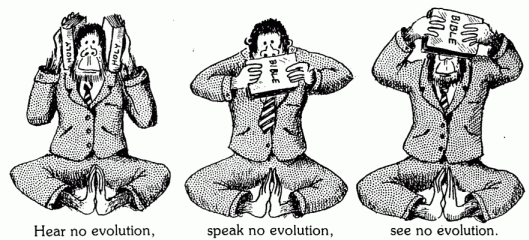What's Bugging the Creationists?
|
Motivations of Creationists and Intelligent Design Advocates.
Creationists and promoters of intelligent design are clearly strongly motivated to get their views recognized as scientifically respectable, and to impose them upon the school science curriculum. What is the source of this motivation? What bugs them so much about the way science is taught?
Science and science teaching do not deal with anything supernatural, so you might think that this would give no offense to religious persons. But in fact, that's the very reason for their discontent. Science without the supernatural, is, to them, materialistic, and by not including God, is implicitly denying the importance of, or even the existence of, God. At the very least, leaving God (or any supernatural creator/designer entity) out of natural science, is in effect saying that nature can get along quite nicely without God.
Science does not answer "why" questions but only "how" questions. Religions generally treat "why" questions as the most important and most meaningful questions, and are eager to provide their own answers to such questions. Still, why should these two views conflict, if science and religion remain on their own turf? Scientists, even religious ones, usually do not impose their views on religions. But some religious persons, especially evangelical ones, feel that they must impose their views everywhere on everyone. Further, they are offended when anyone fails to recognize the "truths" that they see as self-evident. For many years, fundamentalists and evengelicals perceived themselves as marginalized. They felt that they "got no respect". Now, at least in the USA, they have reasons to feel that their situation, at least in the public arena, is changing. They have tasted power, and are ready to use it toward their social and political ends.
More moderate mainstream religions have not jumped on this bandwagon. Most are comfortable with the theory of evolution. One can retain a belief in a creator/designer/god and still accept evolution. After all, their god is seen as perfect and all-powerful, and certainly capable of designing a universe that is self-sustaining, never requiring maintenance or tinkering. Such a view does not require a god to occasionally invent new species, as intelligent design hypothesis assumes. It allows the universe to run along merrily entirely by natural processes. It's those natural processes that science studies and describes.
|
Such a self-sustaining universe does not provide evidence for a designer, as we have seen, for its evolution can be understood by natural processes alone. The ID proponents want to find evidence for a designer, and one of the evidences they put forth is "gaps" (unexplained transitions) in the evolutionary sequence (often including gaps in the fossil record). These, they say, are evidence that the intelligent designer stepped in to make a new species, or bridge a gap that natural processes could not.
In short, these folks want an "activist" intelligent designer, who continually, or at least periodically, intervenes in the operation of the universe. A self-running universe would not show any evidence of an ever-present designer.
Gap theory.
Does this "god of the gaps" serve their purpose? Let's fantasize for a moment, to make a point. Suppose that those gaps the creationists fuss about are so serious that no conceivable natural process could bridge them. Suppose that a new species does just suddenly appear at some point in time, without any hard evidence that it developed from earlier species. [Never mind, for the moment, that no species has ever appeared in history that didn't have any biological resemblances to previous ones.] So, the ID proponents say, this is "evidence" for a designer who plunked down this newly designed critter in the timeline of biology. What? How does that follow? It's only indicative that (a) we haven't found the evidence yet to bridge that gap, or (b) we haven't been clever enough to figure out the processes involved, or (c) perhaps some natural processes we never even imagined, perhaps even new laws of nature, were operative. Even if you rule out all of those possibilities, you could still imagine all sorts of fantastic supernatural scenarios (but in so doing, you wouldn't be doing science, but something more like science-fiction).
So let's invent such a possibility, just for practice. Perhaps there are other universes. From time to time one of these intersects with ours, and some alien animals, plants or other organisms from that other universe cross the intersection and remain in our universe. Can this scenario be proven? No, the so-called "evidence of the gap" isn't specific enough to support this particular possibility, or any other, nor can it disprove any other imagined possibility. In other words, such "evidence" is worthless to demonstrate anything.
|
|---|
Suspension or interruptions of natural law are called "miracles". [We can name even things that can't happen.] Whatever you call them, if suspensions of natural laws were to happen, they would tell us nothing useful about anything. Furthermore, we have no hard, scientifically acceptable evidence that any miracles have happened in the whole time history of the universe.
|
Let's look at this from another perspective. How do we manage to learn anything about how nature works? Only because nature works in a regular and reliable way. Once we describe some behavior in a law of nature, we have learned that we can be confident that nature won't play a trick on us and change that behavior. But if irregular and unpredictable things were to happen now and then (real, and not merely due to flawed data), we could not do science on them. The methods of scientific investigation would be powerless to tell us anything about the reasons for them, or to predict when the next irregularity might happen.
How have the creationists and ID advocates managed to obscure these simple facts? As usual, they bury the ugly deficiency of their theory in a pile of flummery and obfuscation (translation: irrelevant garbage). The deception goes like this. Take a concept that is generally and uncritically accepted by lots of people, even though it is unsupported by any evidence or logic (such as the idea of a supernatural creator/designer). Then point to evidence supposedly supportive of it. The concept precedes the evidence, and the concept is already decked out with attributes: intelligence, powerful, invisible, and perfect. The attributes are already uncritically accepted by non-scientists. Then any evidence that seems to fit these attributes is counted as evidence proving the existence of the assumed "creator/designer" entity. This is why the ID argument has appeal for those with little knowledge of science and little experience in recognizing flawed arguments. There's a big difference between an argument that merely "sounds good", and a good, sound argument.
In science, evidence precedes theories. We insist that evidence must be specifically supportive of a theory. If evidence supports a whole host of diverse theories equally well, we don't consider any one of those theories persuasive. Theories that are only devised to "explain" one narrow or isolated piece of evidence are not taken seriously. Scientific theories should be capable of embracing diverse phenomena, and unifying a diversity of laws, that is, they should have broad scope.
So far, the ID advocates have provided no research that has done anything useful in science. In fact, one can't find any scientific research at all that they have done. Theirs is a philosophy masquerading as a scientific theory, still in search of any scientific utility.
|
ID propagandists spend much effort writing books and articles about "evidence" for "irreducible complexity"—specific examples from nature that they claim could not have possibly arisen from evolution. They have not made that case persuasively to scientists, for every one of their examples has been discredited. But their output on this subject does serve to distract the public from the fatal flaws in their larger chain of argument. Suppose somehow they were able to conclusively demonstrate that there's a creature with irreducible complexity. That fact would get them nowhere, for it would be evidence of—absolutely nothing specific. Such evidence certainly wouldn't prove their ID hypothesis or even be suggestive of it. So they are wasting their time focusing on this issue.
Naturalism and materialism.
You often hear creationists complain about the "naturalism" of scientists and of science teaching. One of the stated goals of ID advocates is to "drive a wedge" between "naturalistic science" and a "new" science that acknowledges and includes God.
Creationists see "naturalism" as an evil to be fought on every front, and they wish to replace it with "theistic realism". In short, it's a strategy to "put God back into all aspects of human activity, science, politics, law, and education". They fear that the "naturalism and materialism" of science education will turn their children away from God, thereby leading them to reject God and then to do all sorts of evil. Indeed, they see that as already happening. In their writings, creationists equate naturalism with materialism. They aren't good at making subtle distinctions.
|
Science today adopts "methodological naturalism" (MN), in which science is carried out without making supernatural assumptions and without using supernatural concepts. Science is simply silent on supernatural and theological questions. This is not done as a deliberate way to reject God, but simply because supernatural hypotheses don't advance or illuminate science in any way. They are useless in science. Simone Laplace put it well when asked why there was no mention of God in one of his books. He replied "I have no use of that hypothesis." Scientists can, and many do, have religious beliefs. They can entertain any supernatural hypothesis they like "after hours", but they know that it has no usefulness and no justifiable place in their scientific work.
Creationists characterize this very practical and necessary methodological naturalism of science as a deliberate and insidious plot by the scientific establishment to destroy religion and banish God from people's minds. This may be the primary motivation of creationists and ID promoters.
|
Purpose.
Theists often wave their hands at the world in general and say "Surely this wonderful and perfect natural world all around us must have a purpose." This raises the issue of "purposeful design" by an "intelligent designer." If you respond by looking incredulous and saying "Why should it have a purpose?" they generally cannot believe you are serious.
|
My feeling is "How can anyone with a straight face say this world is perfect?" Even a theist must realize that imperfections abound in nature, and with a little thought could make suggestions for their improvement. Creationists are fond of citing the human eye as an example of wonderful design and functional perfection. Not everyone sees it that way. Hermann Helmholtz, who did pioneering studies of human senses, once remarked that if his instrument-maker ever sent him an instrument as badly designed as the eye he'd send it back to be remade. We now understand the evolution of the human eye quite well. It was a series of small changes that improved performance, but never perfected it. Ask anyone who suffers from cataracts, macular degeneration, or any of the other afflictions of eyesight about the perfect design of the eye. Some animal eyes developed over a different evolutionary path, and have some features that are better than those of similar function in the human eye. For example, some marine animals have the light-sensitive receptors on the retina in front of its blood supply, unobstructed, while humans have them buried behind a network layer of blood vessels that obscure portions of the retina from the incoming light. But once an evolutionary path is taken, there's little chance of "going back" to fix those mistakes. We are stuck with them. Any orthopedic surgeon can easily envision a better biological design of the human knee, hip joint, or spine.
|
And who can say that cancer is a beautiful and wonderful thing? Name any of the other gruesome deformities and diseases that can afflict man, and then talk about the beauty and perfection of nature. Of course, theists have all sorts of ways to hand-wave those away: "They are the result of man's sin in the Garden of Eden" or they "Are the work of the Devil." But we must stick to science here, and not digress into fairy-tales.
If a theist asks, "Surely you don't think all this could have arisen by blind and purposeless chance?", I have to reply that the things going on in the universe show no evidence of purpose, and are in that sense "blind". Chance and probability play a role in nature, but geometry and natural laws must be taken into account and they are responsible for the "appearance of design", so it's never "mere chance".
This is a major reason why creationists reject science. They want a universe with guiding purpose, and science shows no evidence of such a thing. They also like to think that the purpose was leading to mankind, and that we were made "In God's image". Science has nothing to say about such notions.
 |
| Perhaps science should ask for equal time in Sunday Schools. © 1987 by John Holden. |
|---|
A suggestion to theists.
As I have said, science doesn't prove or disprove any supernatural beliefs, for science is silent on such matters. However, I will offer this suggestion to theists, with no scientific weight at all behind it. Theists could simply assume that their creator/designer/god designed the universe by declaring some natural laws and fashioning a geometric matrix of time and space for these laws to operate in, then letting "nature take its course". The result is what we see today. This creator didn't have to return to tinker with it as time progressed within it, for the result was entirely the result of those laws the creator invoked. The universe shows no evidence that could possibly reveal its manner of creation. So science can study it and describe its behavior without ever conflicting with religion. Religion can grapple with questions about the divine purpose, the existence of evil, disease, and other theological issues all by itself without interference from science. That is essentially the position of some mainstream religions, which have no quarrel with science. [1]
 |
| © 1987 by John Holden. |
|---|
Of course, this will never satisfy the creationists.
Scientists are not blameless.
Let's admit that some scientists have been guilty of trespassing into theological matters. They have strayed beyond the boundaries of the knowable into speculations on the purely hypothetical. Some of them write books in which the boundaries between established science and wild speculation are blurred to invisibility. Too often they use the word "believe" without qualifying it as "tentative or provisional acceptance". They do not clearly and carefully state the limitations of presently known data, and the resulting limitations on our laws and theories. Some have even been known to utter the word "truth", which is entirely unnecessary in scientific discourse. Some of this has trickled down into school textbooks. The fact is, fantasies and fiction sell books, while hard facts do not. The public has a thirst for the fantastic and miraculous. This sort of thing has made science an easy target for those who have only superficial knowledge of how science is really practiced.
Endnotes and Afterthoughts.
[1] In these essays I have said very little to argue for evolution. There's no need to. Evolution is a firmly established fact, and no ID proponents have challenged or discredited the facts from paleontology, archaeology, biology, biochemistry, etc. etc. (The creationists used to do this, but every time they got egg on their face from distorting or misinterpreting facts, or what a friend of mine characterized as "Lying for God.") What ID proponents complain about is that scientists see no need for supernatural intervention in this process, and no evidence specifically pointing to supernatural intervention. ID proponents want an alternate interpretation of the facts, and also want to assert that "The intelligent designer is responsible for everything." Now the intelligent designer notion has three interpretations (at least). (1) The designer designed everything so that it "runs itself" without maintenance or intervention, or (2) The designer guides every step of the process, or (3) The designer only needs to intervene in natural processes once in a while, producing apparent "miracles" that are not explainable by natural laws. The first two interpretations are entirely consistent with a purely lawful process of evolution. Only the third one challenges conventional evolutionary understanding, for it claims that there are steps in evolution that cannot be accounted for by natural laws. The first two interpretations do not generate any conflict between ID and science.
- —Donald E. Simanek, February, 2006.
Intelligent Design Creationism: Fraudulent Science.
Evolution Deniers.
Intelligent Design: The Glass is Empty.
Order from Disorder. Creation in Everyday Life.
Random Thoughts on Randomness.
Is The Real World Really Real?
Uses and Misuses of Logic.
The Scientific Method.
Proofs of Unknowables. The Proof is Pudding.
Theory or Process?
Is Intelligent Design an Interesting Philosophical Idea?
Why not Angels?
What's Bugging the Creationists.
Summary and Conclusion.
Return to Abuses of Science.
Return to Donald Simanek's home page.


